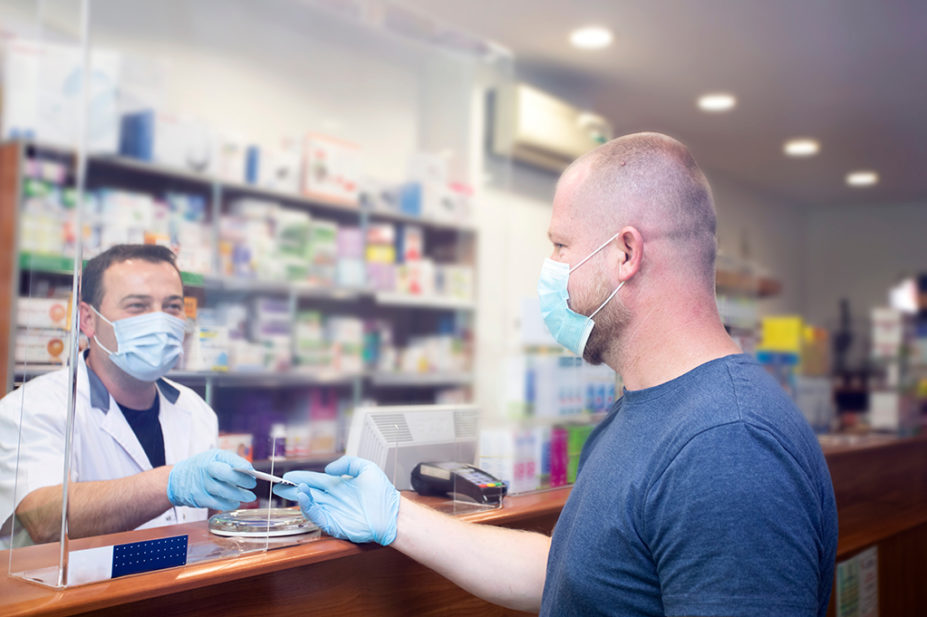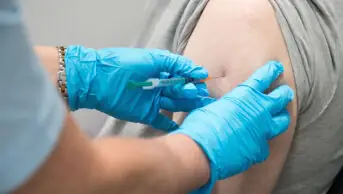
Shutterstock.com
The Health and Safety Executive (HSE) did not investigate at least 89 reports of occupational exposure to COVID-19 submitted by NHS trusts, with some hospitals subsequently discouraged from making further reports, The Pharmaceutical Journal has learnt.
The reports, which were made to the workplace health and safety body under the Reporting of Injuries, Diseases and Dangerous Occurrences Regulations (RIDDOR) 2013, were labelled as “non-reportable” by HSE. They included ten deaths of staff from COVID-19.
The revelation came after unions repeatedly raised concerns that NHS trusts were underreporting COVID-19 incidents and the HSE’s criteria for occupational exposure to the virus were too strict.
Shelly Asquith, health, safety and wellbeing officer at the Trades Union Congress (TUC), told The Pharmaceutical Journal that the trusts’ responses are “really concerning”, adding that it suggests a continued “element of denial about COVID being airborne and it not being possible to necessarily pinpoint where exactly somebody was exposed once it’s in the air”.
Asquith added that the trust’s responses are particularly concerning as it may prevent NHS staff from accessing disablement benefits in future.
“The potential consequences for those trying to make claims in the future are really severe,” she added.
All employers are legally required by RIDDOR to log incidents with HSE where COVID-19 could have been ‘released’, an employee has been diagnosed as having COVID-19 or an employee has died as a result of occupational exposure to the virus.
Data gathered by The Pharmaceutical Journal through responses to a Freedom of Information (FOI) request reveal that 173 NHS trusts in England submitted at least 6,007 RIDDOR reports relating to COVID-19 to HSE between 30 January 2020 and 11 March 2022.
These included reports following at least 213 cases of ‘dangerous occurrences’ — defined as an unintended, specified event, which may not result in an injury, but does have the potential to cause significant harm — 5,753 cases of cases of COVID-19 and 41 fatalities following exposure to COVID-19 in the workplace.
However, 3 trusts noted that 89 of their reports in total were refuted by HSE on the basis that they could not provide evidence of a direct link between exposure to COVID-19 and the workplace.
In its FOI response, Yorkshire Ambulance Service NHS Trust said that it submitted five reports to HSE following staff deaths from COVID-19, but this resulted in “all five being rejected by the HSE, therefore zero [were] entered onto the RIDDOR database”.
“HSE maintained that the occupational exposure of COVID-19 could not be clearly linked to the workplace as community cases were also highly prevalent at the time,” the response said, adding that a report filed under the ‘dangerous occurrences’ category was also rejected.
A spokesperson for the trust said that HSE was “looking for evidence of work-related exposure when assessing COVID cases for RIDDOR rather than just a likelihood”, adding that “it is understandable that they would review the submissions made to them and not all would meet their criteria”.
In another response to the FOI request, University College London Hospitals NHS Foundation Trust said that it reported five deaths for HSE’s consideration.
“In each case, the HSE found that were was no reasonable evidence that the infection was contracted at work,” a spokesperson for the hospital said.
The FOI response from South London and Maudsley NHS Foundation Trust said it had submitted 78 reports after staff contracted COVID-19 “between December 2020 and February 2021 as a precaution where an occupational exposure could not be definitively ruled out as a possible cause”.
A spokesperson for the trust said: “In conversation with HSE, they confirmed our approach had been over cautious and clarified reports were only needed when a direct occupational exposure had been confirmed and that since then we have not submitted any more.”
A spokesperson for HSE told The Pharmaceutical Journal that when a RIDDOR report is received, each report is considered against HSE’s ‘Incident Selection Criteria‘ to determine what will be investigated.
Where it is decided that a case is not reportable, HSE said the report status is changed to ‘non-reportable’, but it remains on the RIDDOR database.
Cases deemed ‘reportable’ are then investigated in accordance with HSE’s investigation procedure.
HSE has confirmed that the reports it received from these organisations are on the RIDDOR database.
On 19 May 2022, the British Medical Association (BMA) published a report warning that workplace-acquired COVID-19 was being underreported from NHS organisations through RIDDOR.
The report highlighted: “Better RIDDOR reporting would have given the HSE a better idea of the prevalence of workplace-acquired COVID-19 infection in health settings,” adding that it “would also have helped to identify more unsafe workplaces”.
Commenting on The Pharmaceutical Journal’s findings, Raymond Agius, occupational medicine committee co-chair at the BMA, said: “The HSE threshold for RIDDOR reporting, as shown by HSE’s guidance and its correspondence with employers, is too high.
“It does not take into account the increased risk that health and care staff face simply by sharing the same environment as patients — even if they aren’t directly clinically treating those who are known to be COVID-positive.”
Paul Day, director of the Pharmacists’ Defence Association, said: “Reporting of workplace exposure to a potentially deadly virus is critical, however it happened.
“Having that report on record can be useful evidence that it happened if there is need to follow up due to the consequences for the individual and can improve protection arrangements.”
He added that while “the exact moment of exposure may be harder to confirm for healthcare workers risking their own safety during in a pandemic … such reports are still immensely valuable and the HSE should have done more to encourage reporting”.
A spokesperson for HSE said: “It is right that we assist duty-holders in ensuring that the reporting process generates accurate information about workplace exposure and risk.
“The pandemic was challenging for all concerned — at the time we bolstered our guidance to ensure that responsible persons (usually employers) only report cases where there was reasonable evidence suggesting that the cause of infection was due to work-related exposure.
“This does not mean that we discouraged reporting — all RIDDOR reports submitted by duty-holders are retained on our records, not deleted.”
How HSE COVID-19 reporting advice changed
The Health and Safety Executive (HSE) first published guidance for reporting incidents relating to COVID-19 under the Reporting of Injuries, Diseases and Dangerous Occurrences Regulations (RIDDOR) 2013 in April 2020.
The guidance advised employers that they must report an incident “if there is reasonable evidence that someone diagnosed with COVID-19 was likely exposed because of their work”.
“An example of a work-related exposure to coronavirus would be a healthcare professional who is diagnosed with COVID-19 after treating patients with COVID-19,” it added.
However, this example was later removed from the HSE website and, in advice issued directly to many public bodies — including hospices, police forces and NHS trusts — HSE said: “It will be very difficult, if not impossible, for employers to establish whether or not any infection in an individual was contracted as a result of their work.
“Therefore, diagnosed cases of COVID-19 are not reportable under RIDDOR unless a very clear work-related link is established.
“HSE do not anticipate receiving many cases of RIDDOR reportable incidents, as such cases will not be easy to identify, and are anticipated to be rare, especially as prevalence of COVID-19 increases in the general population.”
2 comments
You must be logged in to post a comment.



This indicates complete white wash of the responsibility of the HSE in regards to the safety of health workers. This response not only dramatically reduces the confidence in the reporting system but also makes you wonder whether you should be working in the NHS or any other healthcare system if there is no concern about adverse outcomes to the staff that work there.
The HSE might find it's hands tied in looking at both non-fatal and fatal cases of COVID, as unlawful killing merits a criminal rather than civil standard of proof.
Independent and dispassionate post-hoc assessment can offer perspective outside of the pressure cooker of the occupational environment. Regardless of the HSE, NHS organisations have a duty of care to their employees in real time and the Duck Test applies.